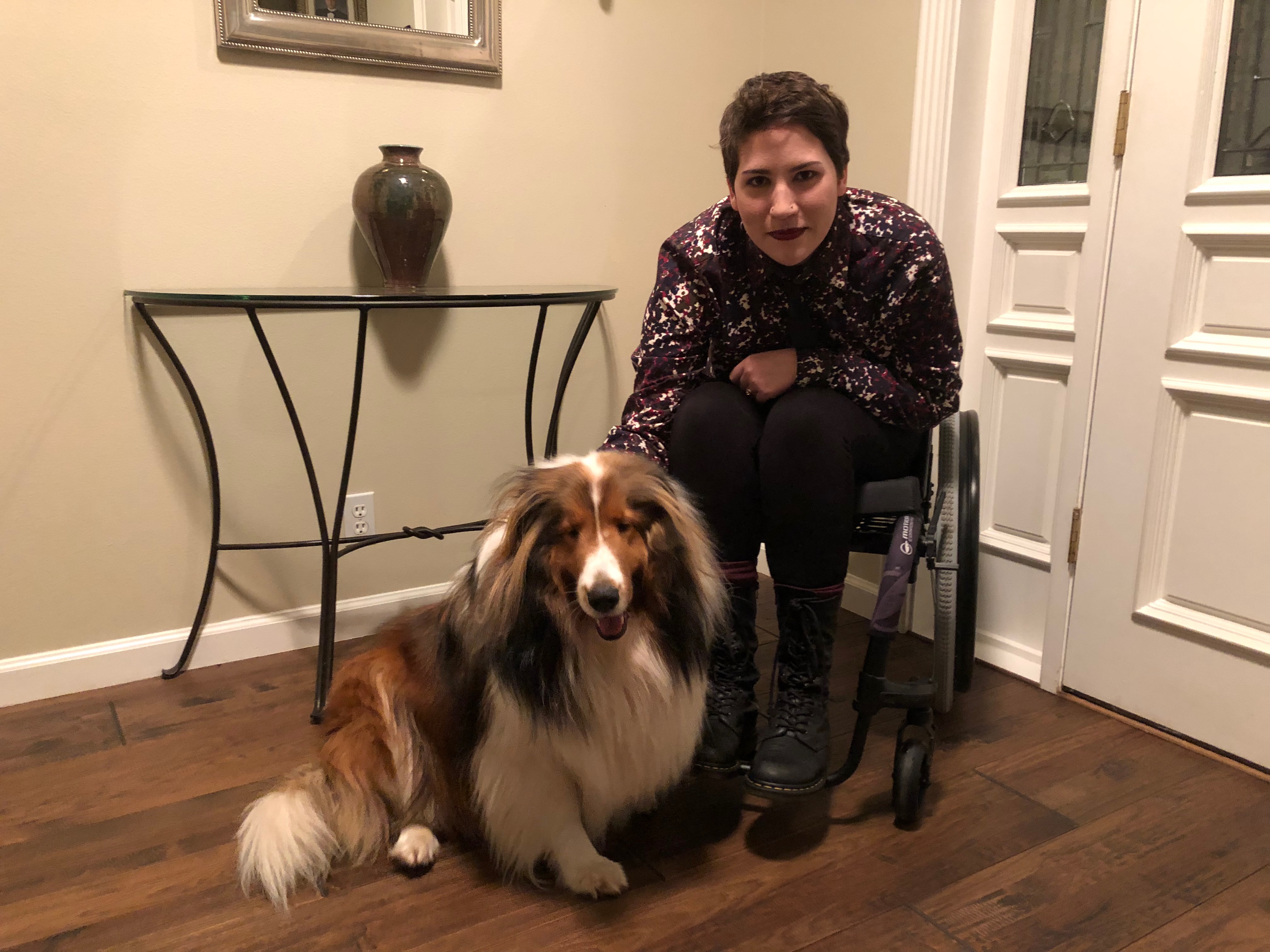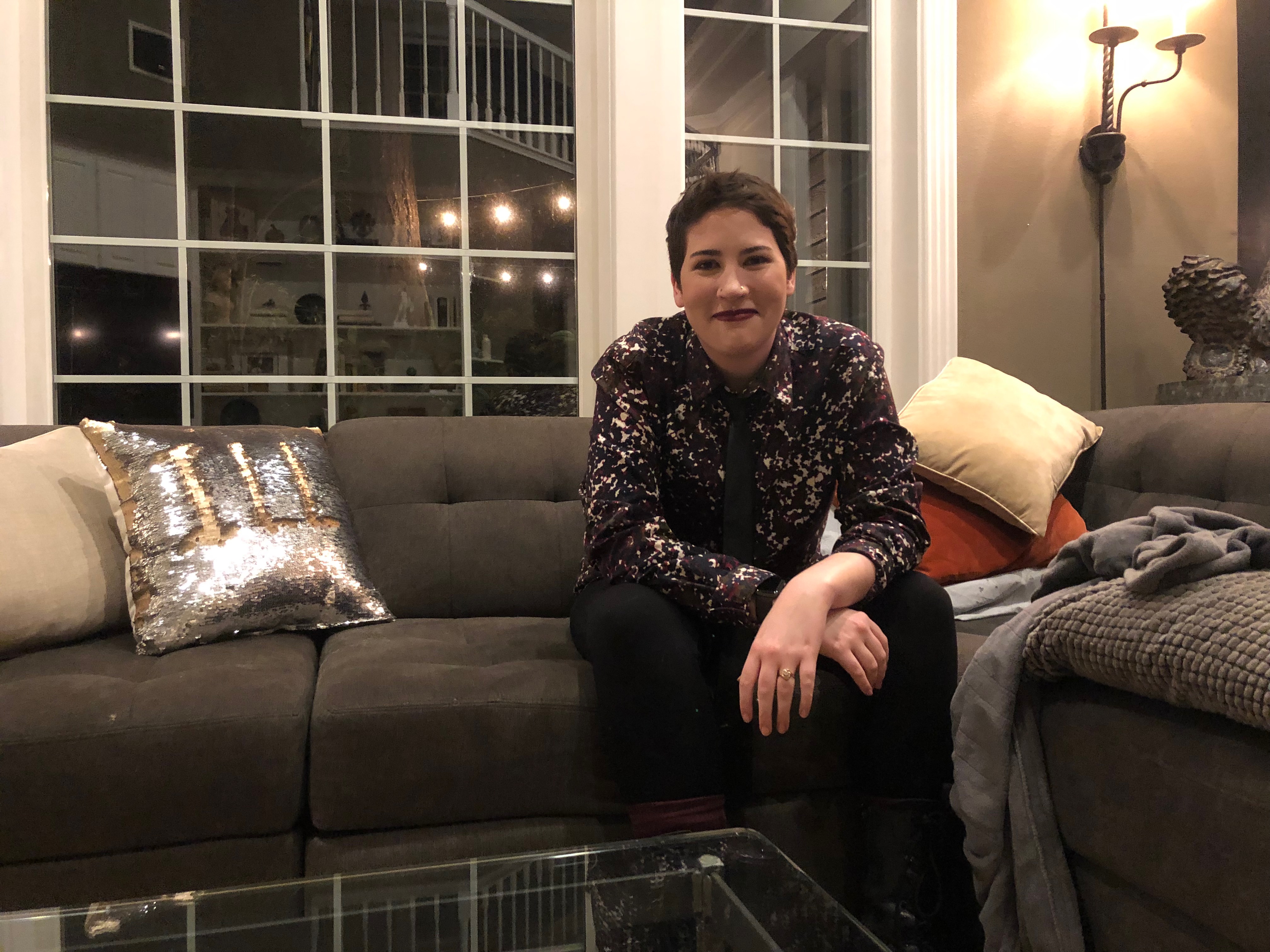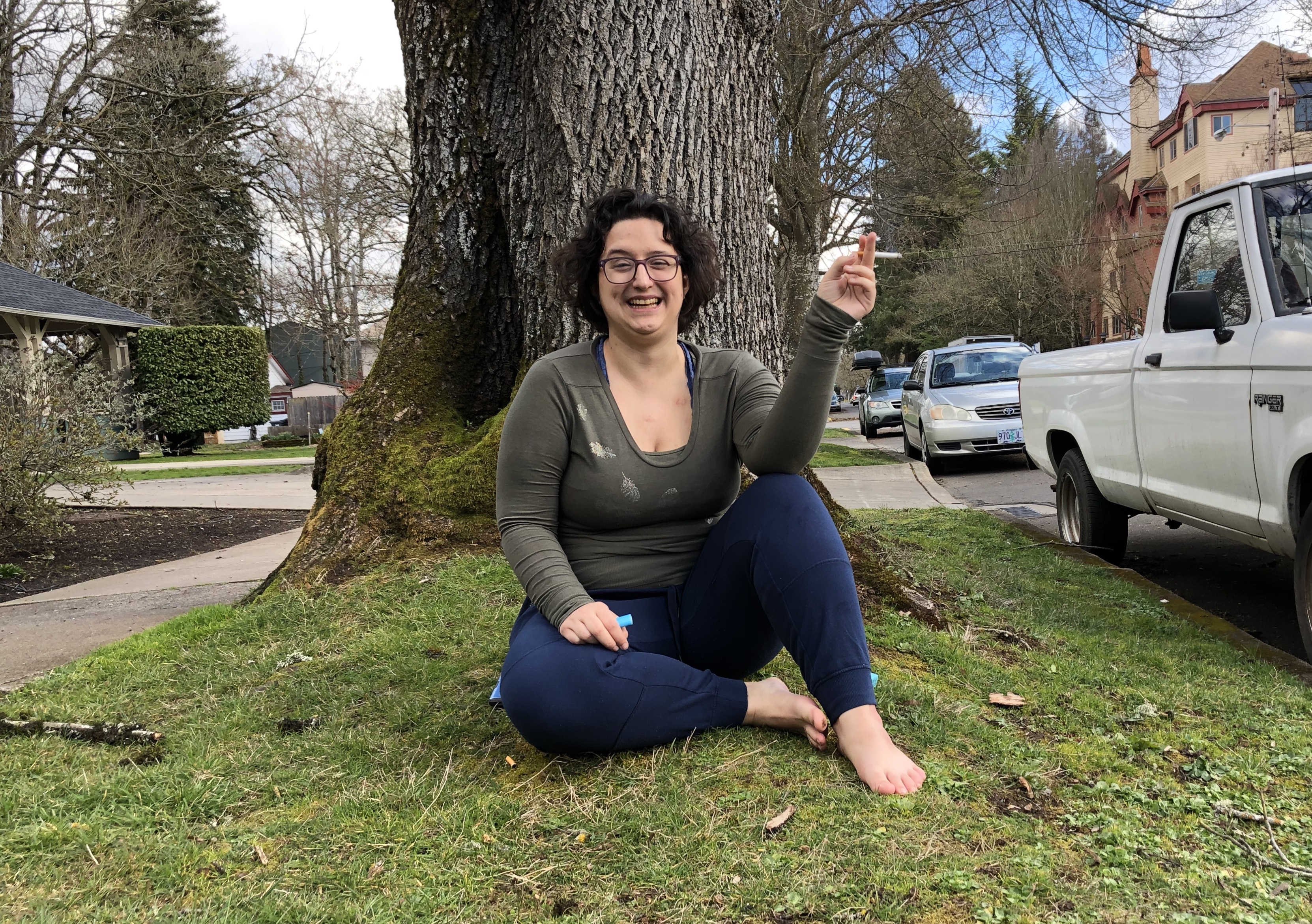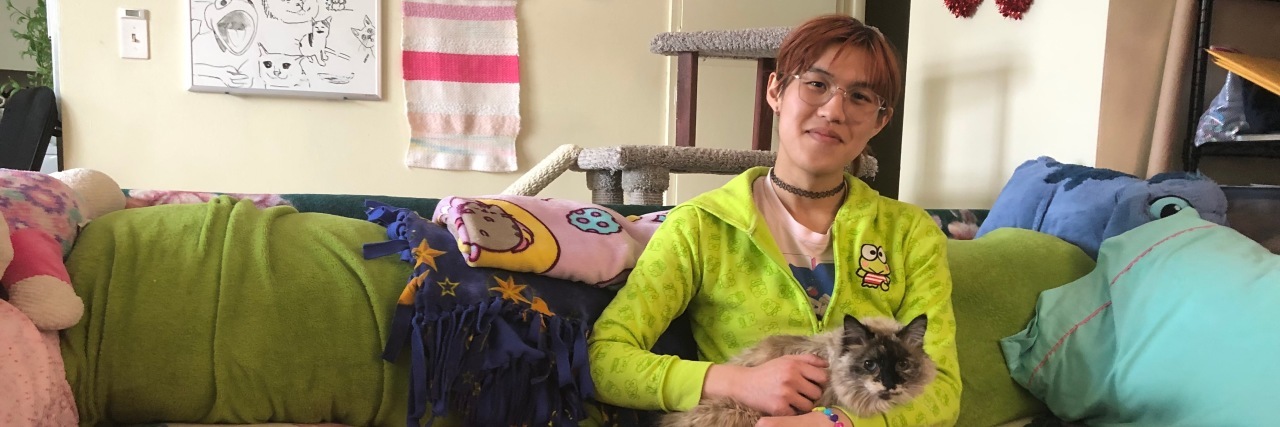What These Queer Disabled and Chronically Ill People Want You to Know
The narratives around ill and disabled people generally fall into categories of awful tragedy or inspiring recovery. If you don’t feel “inferior” or “defective,” it must be because your body has “improved” or you’re in better health. Perhaps you pushed through fibromyalgia to run a 10K. Perhaps you beat cancer. These are some people’s truths, and they should be honored. But they are also the most societally acceptable truths. For those of us who are ill and not getting better, these narratives are often neither relatable nor helpful.
Being ill or disabled in a society that doesn’t accommodate or value these bodies is difficult. Being LGBTQIAA+ on top of that can add to an already significant sense of non-belonging. Chronically ill and disabled people often feel unrepresented in the world. That doesn’t change much in the queer community, where challenging norms doesn’t seem to extend to notions of ability. Many people in my life who identify as queer, ill and disabled feel they are not heard, that their needs are not met, and they feel out of place in the communities that are meant to support them. I spoke to a few of them about their experiences with queerness and disability, how these positions impact their lives, and how they feel the situation might be improved.
Angel
Angel is a queer, transfeminine, disabled person from Eugene, OR. For her, emotional stress is just as much a concern as physical limitations. One of the main challenges she faces is visibility; being visibly trans and disabled is emotionally exhausting in a society that doesn’t always support or accept people in these positions. Feeling comfortable, or even just safe, is a full-time job.

Ada: How do you feel these identities affect your life?
Angel: “Not to say that I haven’t been doing a lot of physical labor now [or having pain because of it]; I still do. But a lot of the tension and anxiety comes from having to present myself to the public. [It] really wears you down. Especially now, after the election… It’s hard to go about your day without that burden weighing down on you, thinking that the world doesn’t see you as who you are. You take it day to day, like most things. You don’t have a lot of reliable constants; you have to think about, “What way am I going home?” and “How am I going to make it from one side of town [to the other]?” It’s definitely harder in other cities, but I feel like even if I were anywhere else the pressure that comes with visibility is difficult sometimes.”
Ada: How do you cope with that anxiety?
Angel: “It’s really important as a queer person, as a person that has dealt with disability and chronic pain and chronic illness, [to balance] self-care, even when it’s things that you don’t want to do on your own accord. In the past couple of years, I’ve found that it’s really important to try to surround myself with support systems and make an enjoyable environment. Having to stay home a lot and not having the spoons to go out and do things socially all the time has made me focus a lot more on what kind of home I want to be in a majority of the time. Outside has a lot of anxiety for me; I want to make sure when I come home the stress can find a way to decrease.”
Ellery
Ellery is an agender queer person living in Eugene, OR. They have multiple chronic illnesses, including Ehlers-Danlos syndrome, dysautonomia (POTS) and polycystic ovary syndrome (PCOS). They are also an ambulatory wheelchair user; they use a wheelchair for traveling longer distances and on days when their symptoms limit mobility.

Ada: What are your thoughts on being disabled in queer spaces?
Ellery: “You definitely don’t see a lot of media representation surrounding the intersection of queerness and disability, and the real-life events that are put on that center queerness don’t really incorporate that intersection into their planning. So much of Pride events only cater to the stereotype of queer people as energetic, rowdy, flamboyant able-bodied people that can tolerate really loud noises. It’s like a rave setting almost, with the loud noises and the bright lights and bright colors and everything — it’s overstimulating. Pride is sort of like a giant party, whereas I’ve never felt like my life is a giant party, or that I could still be proud of my identity when the normative ways that people typically express it don’t feel accessible to me. It’s not a type of representation that appeals to me; I align more with the Quiet Queers ™ and bookworms.”
 “A lot of things are really inaccessible from a mobility standpoint as well, like the last Pride event that we had here in Eugene. First off, it was held in a field, so it was not wheelchair accessible at all; it was all grass. There was a drag show too; for me, those are always way too overwhelming, with all the dancing and lip syncing and colors and lights. It all just seems like it requires an amount of energy I have never possessed in my life. Coming across as prideful is very contingent upon being physically expressive, and there aren’t a lot of outlets for queer pride that cater to a more subtle approach. It’s all extremely isolating.”
“A lot of things are really inaccessible from a mobility standpoint as well, like the last Pride event that we had here in Eugene. First off, it was held in a field, so it was not wheelchair accessible at all; it was all grass. There was a drag show too; for me, those are always way too overwhelming, with all the dancing and lip syncing and colors and lights. It all just seems like it requires an amount of energy I have never possessed in my life. Coming across as prideful is very contingent upon being physically expressive, and there aren’t a lot of outlets for queer pride that cater to a more subtle approach. It’s all extremely isolating.”
Ada: Why do you think accessibility is such a problem in the queer community?
Ellery: “I get the impression that it’s a bit unconscious on the part of the able-bodied people within the queer community. I don’t think it’s maliciously exclusionary, but I also know there have been instances where it’s not coming from a place of complete ignorance, but rather complete unwillingness to accommodate. Perhaps because some people believe that being queer is already ‘hard enough’ and to be asked to think about more issues in the world is too overwhelming.”
“You see that a lot when it comes to race within the LGBT community too, when people think they can get away with having racist views just because they’re queer. People try to equate those two and draw a lot of parallels between the Gay Rights Movement and the Civil Rights Movement, when really there is no comparison; it’s apples and oranges. The Queer community has a big issue with intersectionality in general, and I think some of that has to do with media representation. We’re told there’s one way to be queer, so to be OK with stepping outside of that, when you’re already pushing the margins by being queer in the first place and to push them even further by accepting these other marginalized identities, people think it’s a Big Ask.”
Ada: You mention that the Gay Rights and Civil Rights movements are different beyond comparison, and I can only assume that applies to disability activism as well; are there challenges you see here that might not apply to other activist movements?
Ellery: “The disabled community is one of the only marginalized groups that, in a lot of ways, has to depend on the dominant group, the group in power, to be more involved and actively care than would be necessary in other situations. A large part of the community can’t go to marches and organize things like that and physically be a part of the things other marginalized groups use to raise awareness and further their own cause. Other marginalized groups typically aren’t looking for the direct involvement or participation of the dominant group, but rather just want to not be oppressed by them.”
“A lot of times, people just want to be free and able to do things for themselves, without assistance or permission. Whereas with disability, there is inherently a call for assistance. We don’t need permission, but we absolutely need assistance. That said, we wouldn’t need as much of it if things were set up in an accessible way in the first place. Creating progress [from a disability perspective] is difficult because of the limited ways available to instigate it. You’re sort of stuck in a rut, and you have to get able-bodied people to care enough to kick start it. Setting aside time, money, and energy for activism that may not pay off any time soon is extremely unattainable for a lot of people in the community who are struggling to secure healthcare and literally just trying to stay alive on a day-to-day basis.”
Trillium
Trillium is a self-identified bisexual female cripple from Eugene, OR. She has multiple chronic illnesses, including Ehlers-Danlos syndrome, dysautonomia (POTS), mast cell activation syndrome and C-PTSD.

Ada: How are these identities connected for you?
Trillium: “I got really drawn to these [queer] communities because of being a young disabled person. The only people that sort of understood that experience — of othering, and lack of privacy, and people trying to tell you how you should live your life without understanding your experience — were the queer kids, and the kids that had other things they couldn’t hide that were part of their experience and their lives. Queer activist circles were the most welcoming and most understanding place I’d ever found.”
“After growing up in kind of a shitty household, finding the Gay Straight Alliance and stuff like that where people were so cool and open — it was kind of like finding family. There’s this cross-section of people with lots of different identities… Even though they are discriminated against in different ways, and struggle in different ways, it’s the difference in having to examine your life and society and your place in society versus not having to do that. There’s always a separation between the people who are forced to do that and the people who don’t really have to, [who] engage with it more as an intellectual exercise [or] just never come up against it and never bother to try and look at the way things interact with each other.”
Ada: Do you feel like being ill has affected your experience within queer circles?
Trillium: “I’ve definitely run into a lot of [barriers when it comes to participating in the more able-bodied-centric aspects of queer culture]. In a lot of queer circles and clubs I’ve participated in through school, I’ve always had to be that voice saying, ‘Hey, remember there are disabled people… remember this is a thing we actually have to think about.’ Half the time the student organizations would make [us disabled students] make the food for conferences so there would be a gluten free option, because they just wouldn’t, or said it was too hard to order something from somewhere else for people who needed it.”
“When I’m using mobility aids and am really sick and am around people who know that, they automatically try and think of how to accommodate (if they’re decent people at all). But when you look able-bodied it is just out of sight, out of mind for so many people. And it takes a lot of energy, it’s hard to be like, ‘I need you to change this huge thing that’s going to be inconvenient for me’ and I know I’m not just speaking for me but on behalf of the community, but if you’re the only one in the community who is in that room, you’re always the one carrying that burden.”
Ada: How might queer spaces (and society in general) be more accommodating?
Trillium: “I really wish there were more accessible spaces, both in physical ways and emotional ways in terms of safety. So many people I know are just not comfortable going to the bars in town because of experiences they’ve had there. [A friend of mine] who has a limp has been kicked out of bars over and over because somebody thought they were drunk when they hadn’t even had a drink. Lots of things like that still come up. I guess I feel lucky that I still feel mostly comfortable accessing most of those spaces, but I don’t want to invite a lot of people out because at this point, I am having trouble remembering which friends have been screwed over by which bars. And not everyone wants to drink, and it’s not healthy for everyone be around alcohol, but being isolated [from the queer community] because of that is so awful.”
“It’s complicated. We all have different needs — it’s not like disabled people all have the same needs, restrictions and issues — but I think society looks at us as just this one lump group and misses a lot of the nuance there. I’ve [met people online] who believe invisible disabilities are not real disabilities and say things like ‘don’t come on this page if you’re not in a wheelchair.’ There is plenty of discrimination even within the community, but I don’t feel like we can even get to that because we’re fighting for basic access to spaces and survival.”

